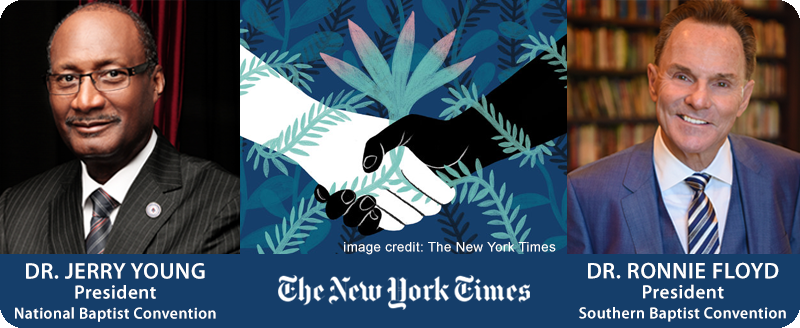From the New York Times: Race, History and Baptist Reconciliation
A few months ago, my friend Dr. Jerry Young and I hosted A National Conversation on Racial Unity in Jackson, Mississippi. Dr. Young and I both believe that it is time for the racial crisis in America to end, and wrote an article together stating such. We also recently had the opportunity to sit down with the New York Times and discuss our efforts to bring reconciliation within our churches. An excerpt is below. You can read it in its entirety here.

RACE, HISTORY AND BAPTIST RECONCILIATION
Laurie Goodstein, The New York Times
WITH the protests in Ferguson, Mo., the Black Lives Matter movement and the massacre of black churchgoers in Charleston, S.C., on their minds, the presidents of the nation’s two major Baptist groups — one predominantly white, one predominantly black — decided it was time for a bold gesture. The Southern Baptist Convention, founded by slaveholders and their supporters before the Civil War, is now the nation’s second-largest Christian denomination after the Roman Catholic Church. Black Baptists formed their own churches and in 1880 founded what eventually became the National Baptist Convention, U.S.A.
Late last year, the leaders each invited 10 of their pastors to join in a public conversation on racial reconciliation in Jackson, Miss. The Rev. Dr. Ronnie Floyd, president of the Southern Baptist Convention, and the Rev. Dr. Jerry Young, president of the National Baptist Convention, U.S.A., visited The New York Times recently to discuss the Jackson meeting, and the goals behind it. An edited version of their conversation follows.
Q. What was it like being in that room?
YOUNG For me personally, it was almost euphoric. Literally to be in that room dealing with that particular issue in light of my own personal history and the history of Mississippi, and Southern Baptist history. That moment was filled with hope and a tremendous sense of possibility.
Q.You’ve told me that you were born on a plantation in the Mississippi Delta and grew up experiencing racism. Did you tell the Southern Baptists about those experiences?
YOUNG In the little town I grew up in, Lamont, just north of Greenville, there were three stores, and I remember distinctly once, we went into one store and there was an elderly man there. They had a cooler where you got the sodas and took them to the counter. The man went and picked up a Coke and went to the counter, and the person behind the counter refused to sell him the Coke because it was a white man’s drink. He had to put it back in the cooler.


